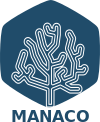Ministry of Fisheries and Marine Resources, Solomon Islands
With 494 known coral species from 76 genera, Solomon Islands is located within the Coral Triangle Region, the region comprises the highest coral diversity in the world.
Coral reefs play an important role as a source of social, economic, food security and livelihood for many communities in Solomon Islands.
However, natural and anthropogenic impacts poses critical threat and challenges in coral management and conservation. The presentation will briefly look at the history of the coral fishery in Solomon Islands; coral reef status; management and conservation approaches, and the marine protected areas (MPAs).
Stephen Attallifo Mosese works as a Principal Fisheries Officer (PFO) in the Research Section of the Inshore Division within the Ministry of Fisheries and Marine Resources. A Bachelor in Fisheries and Marine Resources; other qualifications includes certificate in Coral Health Index Assessment, Advance SCUBA diver certificate (SSI), Fish Stock Population Dynamics, Ecosystem Approach to Fisheries Management (EAFM), etc. Core responsibilities includes; conducting scientific baseline assessment of marine resources which includes reef-fin fish, invertebrates and coral/benthic cover; stock assessment survey, and environmental impact assessment (EIA). Over the three years he has successfully engaged in a number of scientific baseline assessments within Marine Protected Areas (MPA’s) in Solomon Islands. On November 2018-September 2019 he has taken the lead role in the coral assessment of Solomon Islands, a component to the National Invertebrate Survey of Solomon Islands-a survey which basically aims to provide updated information’s on the stock status of key commercial invertebrates such as the giant clams, Trochus and coral species. Moreover, he was part of the team that conducted the Environmental Damage Assessment (EDA) Phase 1 of the MV Solomon Trader Oil Spill incident in Lavangu Bay in Rennell Islands, Solomon Island on July 2019the biggest Oil Spill Disaster in this region, under the supervision of lead scientist Professor Simon Albert of the University of Queensland (UQ).



